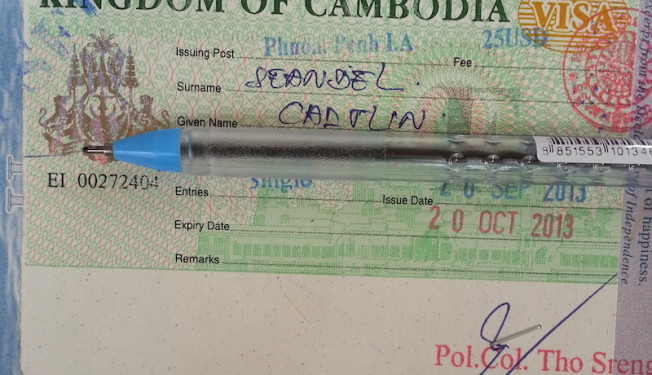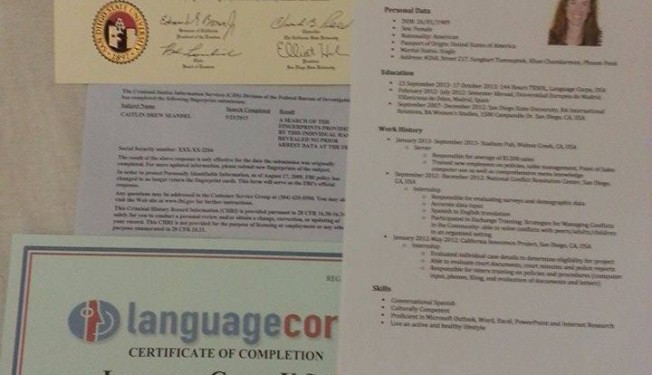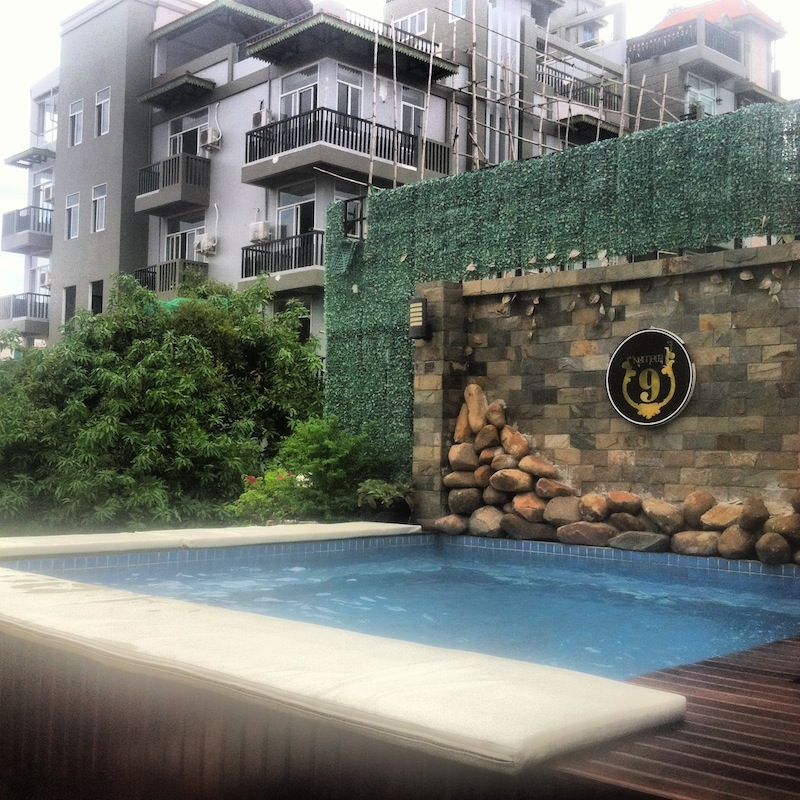Teach English in Cambodia: Everything You Want to Know


Teach English in Cambodia: Everything You Want to Know
Visa
Unless you are from Afghanistan, Algeria, Saudi Arabia, Bangladesh, Iran, Iraq, Pakistan, Sri Lanka, Sudan, or Nigeria you are able to obtain your visa upon arrival. There are two visas available–Tourist ($20) and Business ($30). Make sure to get the business visa because it is the only one that you are able to extend for one ($45), three ($80), six ($165), or twelve ($280) months without having to do a border run.
A border run is where you have to leave the country and re-enter to obtain your visa extension. Tourist visas can be extended for only one extra month and it is single entry only. You will need one passport-sized photo and your passport must be valid for six months from the expiry date.
You are also able to obtain your visa online, if you would like, but it is not necessary especially since getting your visa upon landing is quick and easy.
- Don’t forget to get the $30 visa!
Passport Photos
I would bring 20-25. Every school and landlord is different, and if you end up switching schools/housing you never know how many you may need. If you run out or don’t bring enough there are shops located around town where you are able to get more photos taken without a hassle. Also if you plan on traveling outside of Cambodia those extra passport photos are handy to have for visas.
Job Market
Cambodia believes in worker discrimination, but they are upfront about it. It is common to see job ads stating a preference for gender and age. In regards to teaching, it is easier for women to get better paying jobs here, but with that being said it is still easy to get a teaching job regardless of your genitalia.
On your resume, you should include a photo of yourself, your local telephone number, an address, birth date, and your country of origin. In regards to finding a job there are websites that post listings or you can do a CV drop where you go around to schools and drop off your CV. Expect a lot of phone calls and double check to make sure that your local number is correctly listed on your CV.
Local Phone
Get a cheap local phone. There are phone shops everywhere on Sihounkouk Blvd. where you can pick up a cheap Nokia for $25 (including charger) and a SIM card for $5. To use these phones you must buy credit, which can last you a while.
If you have a smart phone and decide to bring it with you, be wary. There are professional pickpockets and bag snatchers who will not hesitate to take it from your pocket on a quick drive by. A good motto is if you don’t want it stolen don’t bring it out with you–especially if you are out at night drinking.
Replacing a smart phone here is much more expensive than in the West, because there are no plans to sign up so you buy a phone at its full retail price, and you can never be sure if you are buying the real thing or a knock-off.
Documents to Bring
While you do not need your TESOL certification to teach here, it does help. I brought my degree, TESOL certificate, and an FBI background check (not necessary) and made copies and attached them to my CV when doing CV drops at schools.
I would also scan your passport so you can keep a document handy on your computer in case it gets lost or stolen. If this does happen make sure to contact your embassy, which can direct you on the next steps to take.
- So many documents!
Teaching in Cambodia: Everything You Want to Know.
Negotiating and Your Contract
Everything is negotiable in Cambodia, EVERYTHING–including your contract. Many schools will withhold a certain percentage or dollar amount of your pay until you have completed your contract and have returned materials if you were given any. If you break your contract you won’t get that money back. Also sometimes there are things you will have to do at school that you won’t know about in advance.
For example, my friend’s school makes it mandatory for the teachers to stand in front of the school 30 minutes before school starts and for 30 minutes after school ends, waving to parents and students. You may have lunch duty, or are required to stay on campus until a certain time even if you don’t have classes.
Make sure to ask questions!
Are there any extra duties with your teaching job? Are they in your contract? What are the hours? Is the pay hourly or salary? Do they provide lunch? Sick days? Vacation days? Are these days paid or not? When do you get paid? Once a month? Twice? Do you need to bring in your own materials (white board marker, copies, eraser, etc)? Do you get reimbursed? How many different classes do you have? Do you have your own classroom or do you go from classroom to classroom? Are there staff meetings?
If have an hourly wage, do you get paid for these meetings? Does the school get your work permit or is it your responsibility and how much does it cost a month?
Also ask to see the classroom before saying yes so that you can see your working conditions. Most importantly is air conditioning and does it work? It is deadly to be without air conditioning during the hot season in Cambodia. Make sure to ask these questions and more. If you don’t like something, negotiate. Make sure if there is a new agreement that your contract is changed to match it and don’t sign it until it does.
Salary
If you are working full time you should not be making less than $1,000 a month (that is low). While I have my degree, it is not in teaching and when I moved here it was my first time teaching. For my first job I was making $11.50/hour, which I left for a salary job of $1,300/month.
The highest paying school that I know of for teachers who have their TESOL but not proper teaching degrees is $1800 per month which is extremely high and is not the norm. Anywhere between $1200-$1400/ month is average and you will be able to live comfortably.
Cambodia Public Holidays
Cambodia has 25 official days off. If you are paid hourly, you will not get paid for these. Most fall towards the end of the year, and depending on your school you may have more or less time off. This is important when it comes to your pay. This is where salary is beneficial, because who doesn’t love to get paid to vacation, and Cambodia has some awesome places to visit.
Homeless upon arrival?
Book a hostel before or ask a tuk tuk to take you around (I would have a list prepared). Hostels are cheap and staying in one for a month or two while setting everything up is normal and reasonably affordable.
- Number 9 Hotel located near the Riverside and Royal Palace.
The School System
The school system is relatively new here in the Kingdom of Wonder and it wasn’t until this year (2014) that the government started cracking down on cheating and bribery. With that being said, your experience as a teacher may be a bit baffling. Don’t be surprised if you are not allowed to fail students, if the administration changes students’ grades, and if all of your students cheat. The tide is slowly changing but cheating and bribery is still alive and well.
There are also topics that most schools will tell you not to bring up such as government, politics, the Khmer Rouge, and religion. If they come up in your class don’t dismiss them but gracefully bring your class back on track and away from the “taboo” topics.
I had one experience in my class where the Khmer Rouge was brought up. It came up during a conversation about slavery in the United States. After explaining what slavery was one student compared it to the Khmer Rouge (working for free with inhumane conditions). Then the whole class started talking about it and I observed and monitored to make sure the feeling in the room was right and no one was getting upset.
I also interjected with questions due to curiosity, but as a whole the conversation stayed positive and educational and no fingers were pointed, nor were racist remarks made.
Teaching in Cambodia: Everything You Want to Know
Schools and Their Reputations
Western International
A huge school that is eager to hire foreigners. They have a reputation of always paying their teachers late and with little or no notice that you will be receiving your pay late. This school pays hourly. Locations: All over Phnom Penh.
Zaman International
The school with the highest salary that I have heard ($1,800/ month). This school is Turkish and Muslim and very traditional. Men and women co-workers are not allowed to sit together and there are a lot of extracurricular activities outside of normal school hours that are mandatory for teachers. Location: Toul Kork.
Heritage International School
A very relaxed school that pays well with an easy going atmosphere. Teachers have a lot of room to incorporate their personal style into the curriculum. Location: BKK1.
Gateway International School
The pay is reasonable, but they like to have their foreign teachers outside every morning waving and greeting the students.
Golden Gate International School
I almost took a job at this school until I realized that I would have to compile 35 lesson plans per week! That is outrageous. For that amount of work, the pay was not up to par. Also I heard that last year (2012) some teachers who went through the same TESOL certification program that I did got hired here under the condition that for the first 3 months (probation period) they would only receive $800 of their salary and once they passed they would be bumped up to their full salary.
Once the three months passed, the school fired them–and it is pretty much impossible to get fired in Cambodia. Be wary of this school, but also ask around to see if anyone has more up-to-date information about it.
ELT
A good working environment, hourly pay and offers different class schedules; ideal for part-time work. This school has older students (high school and up) and offers many night classes.
There are a plethora of schools in Phnom Penh; look up some addresses and hire a tuk tuk for the day to take you around. You will also get to know Phnom Penh much better and see what a normal commute would be depending on where your school is.
- Happy students!
Housing
There are a couple of forums that I would recommend for finding housing. On Facebook, join these two groups: Expats in Cambodia and Phnom Penh Housing. Also join the Yahoo group Cambodia’s Parent Network, and lastly talking to a realtor is a good idea if you are looking for the whole place to yourself or have a group that wants to move in somewhere. If you are looking for a room, the groups listed above are good resources.
And that about does it. Any other questions are best asked when you actually get here. Phnom Penh is developing at a rapid rate and things change overnight. One of the greatest resources here is the expat community, which is filled with friendly and helpful people who will divulge any helpful tips and knowledge.
So if you are feeling frazzled go out, grab a beer, iced coffee, or fresh coconut, sit down and start up a conversation. You never know what’ll you’ll learn and who’ll you’ll meet!
Hope this helps with you decision and transition into the Kingdom of Wonder….you’ll love it!
Resources: Khmer 440, Facebook page Phnom Penh Jobs Alert, Asia Teaching Jobs, CamHR, Bong Thom Classifieds, Movetocambodia.com
Teaching in Cambodia: Everything You Want to Know
Related Reading
From Waitressing in California to Teaching English in Cambodia
Have you traveled to Cambodia? How was your trip? Email us at [email protected] for information about sharing your experience and advice with the Pink Pangea community. We can’t wait to hear from you.
Teaching in Cambodia: Everything You Need to Know photo credits: unsplash.com and Caitlin Were.













My daughter has been offered a teaching job in Phnom Penh, but she is deathly afraid of snakes – any variety. Are they ever seen in the capital city?